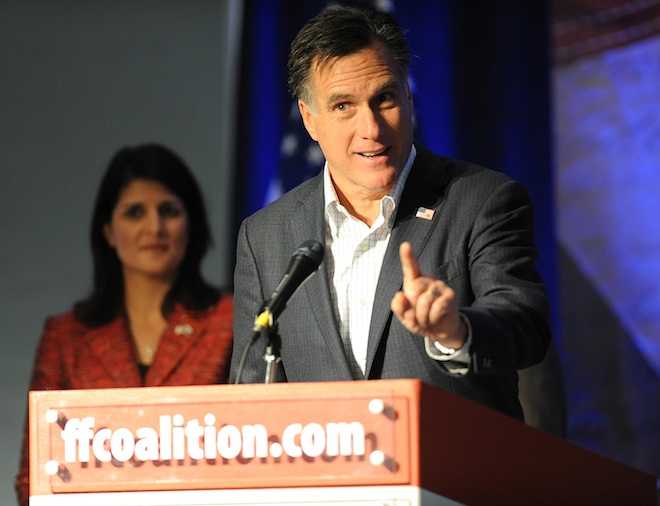Mitt Romney may be on the verge of securing the nomination, but his campaign is still struggling with a pretty basic problem as it looks towards the general election: people just don’t like him very much.
Romney’s never been the kind of candidate to draw legions of screaming fans, but new polling over the last week show a troubling trend for him — his personal favorability numbers are taking a hit. On Tuesday Public Policy Polling (D) showed Romney with a favorability split well into the negative, with 35 percent of general election voters seeing him positively and 53 unfavorably. On Wednesday, the Pew Research center released similar numbers: a 33 – 47 split nationally.
While Republican voters are starting to come around to his candidacy, the rest of the country doesn’t seem too pleased with what they see. Romney’s lost six points on favorability among independent voters since Pew’s last poll in November, leading to a 13 point gap on the metric, 33 – 45. The TPM Poll Average of Romney’s national favorability now shows a 5.8 deficit, and his unfavorability has risen ten points during the last two and half months in our numbers.
The big question is whether the lukewarm reaction to Romney is a serious problem moving forward. It could be that the frontrunner is playing into Democrats’ hands and finally solidifying his out-of-touch millionaire caricature with he public. Or his personal unpopularity could be a minor speed bump.
There are several factors that should encourage Romney supporters. For one thing, there’s a sour mood towards politicians in general these days, so it’s possible no national candidate’s ceiling is higher than a even split. Romney is certainly in better shape than all of his opponents: according to TPM’s Polling Average, Newt Gingrich’s national favorability is a putrid 26-58. Being Mr. Popularity isn’t always a killer advantage either: John McCain enjoyed strong personal favorability ratings throughout 2008 only to get blown out come November. By contrast, Romney often ties and sometimes narrowly leads Obama in head-to-head polls, suggesting his personal likability may not be too big a factor in voters’ ultimate decision.
“Compared to his competitors he’s certainly in a better position. He’s probably no worse off than his Democratic target,” Gary Langer, pollster for ABC, told TPM. “He’s not golden, but it’s a very difficult time the cycle to be golden.”
But Romney’s relatively strong standing amongst his GOP rivals works both ways. His stock may be inflated by the fact he’s been competing among an exceptionally weak field up until now. One worrying aspect of Romney’s recent plunge is that it comes just as the race shifts towards topics more relevant to the general election, like his Bain Capital career and his personal taxes. Nor has Romney, who has been a gaffe machine lately on the trail, shown much resilience against these types of attacks.
Romney has also made heavy use of his prodigious fundraising abilities to dominate the airwaves — the former governor essentially knocked out a surging former House Speaker Newt Gingrich in Iowa through millions in TV ads from his campaign and a pro-Romney super PAC. But he won’t enjoy the same advantages against President Obama’s re-election campaign, which — despite lobbing plenty of attacks at Romney in the press — have yet to get into an expensive ad war with Romney. Like the March Madness MVP whose slow first step proves fatal when he hits the NBA, it’s possible Romney’s game just doesn’t translate to the big leagues.
University of Virginia political science professor Larry Sabato told TPM that he’s still “of two minds” about whether Romney’s favorability issues signal serious trouble.
“On the one hand, it’s early and most normal voters, as opposed to people like us, have only the foggiest notions about Romney,” he said. “But there is no question that Romney’s image is chilly and his team will have to work hard to warm him up. He is ‘the other’ to many people — someone not like the average person. He’s rich, aloof, a model-handsome Mormon with almost too perfect a family, who has never struggled — unless you count political losses. “






